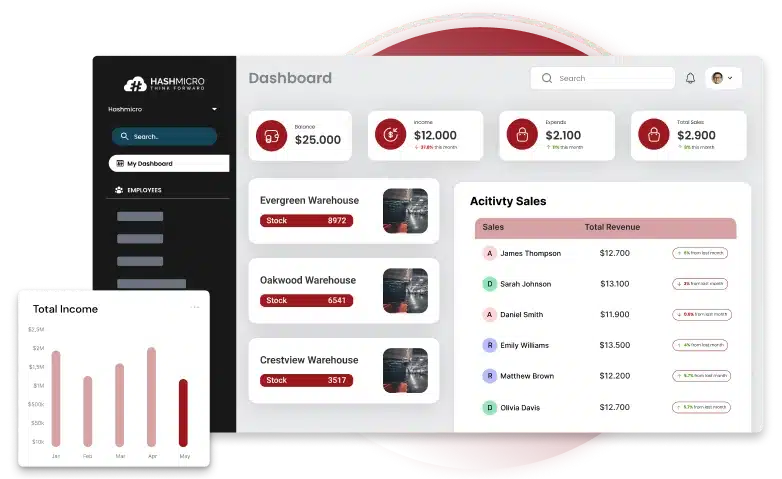Operations management involves planning, directing, and optimizing business activities to ensure the efficient delivery of products or services. It utilizes resources such as labor and technology effectively to maintain smooth operations and fulfill customer expectations.
In Malaysia, businesses often face challenges like inconsistent workflows and delays, which can disrupt overall performance. Effective operation management becomes essential—it enables organizations to streamline inventory handling and supply chain coordination tasks.
According to findings from local business studies, companies that adopt structured operational strategies and have strong support systems tend to see improvements in productivity, regulatory compliance, and service standards.
This article will guide you through the core principles of operations management, its role in Malaysian business success, and the key processes involved in enhancing supply chain efficiency.
Key Takeaways
|
What is Operation Management?
Operations management refers to coordinating and enhancing the resources required to deliver products and services effectively. Its main goal is to streamline internal processes to boost efficiency and fulfill customer expectations.
Effective operations management includes overseeing inventory levels and enforcing quality standards throughout the production management cycle. For example, it requires striking the right balance between resource use and output to ensure timely delivery without unnecessary costs or waste.
It also covers key areas like supply chain coordination, inventory oversight, and workflow automation optimization, ensuring all functions work together smoothly. Its strategic approach is essential for businesses striving to stay competitive and achieve long-term growth.
Why is Operation Management Important for Businesses?
Grasping the concept of operations management is key to understanding how it enhances a company’s performance and efficiency. Without proper oversight, businesses risk higher operational costs, delays, and compromised product quality.
Companies must adopt effective operations strategies to stay ahead in a competitive market. These practices not only streamline processes but also ensure that all aspects of the business function smoothly. Here are several reasons why operations management is vital:
- Enhanced product quality: By implementing strong quality assurance practices, businesses can maintain consistent standards, leading to improved customer satisfaction and a trustworthy brand image.
- Lower operational costs: Streamlining workflows and optimizing resource allocation helps reduce unnecessary production, inventory, and labor expenses.
- Efficient use of resources: With proper planning, companies can maximize time, workforce, and materials, minimizing waste and boosting output.
- Reliable delivery timelines: Coordinated operations ensure that production schedules and supply chains remain on track, enabling on-time delivery and customer reliability.
- Stronger market position: Well-managed operations give businesses the flexibility to adapt, innovate, and respond to market changes, building a lasting competitive edge.
What are the Main Functions?
Successful operations management involves various interconnected tasks that support productivity and drive business growth. These core functions play a crucial role in keeping operations efficient and well-organized:
- Inventory control
- Scheduling and workforce coordination
- Vendor and supplier oversight
- Budget planning and financial tracking
- Operational planning and strategy development
- Monitoring and analyzing workflows
- Mitigating risks and ensuring compliance
- Safeguarding data and maintaining system security
- Ensuring product and service quality
- Technical assistance and system maintenance
- Tracking and managing equipment and materials
- Generating and sharing operational reports
Each function contributes to a seamless business operation, helping companies maintain consistency, adapt to challenges, and achieve long-term success.
Types of Operation Management
Business operations management can generally be divided into three key approaches: goal management, task coordination, and individual oversight. Each plays a vital role in keeping business functions running smoothly and effectively.
- Goal management: This method revolves around establishing clear targets for the organization. It ensures that all departments and teams align their efforts and resources toward shared business priorities, fostering collaboration and unified direction.
- Task coordination: Involves managing and tracking specific activities or projects to ensure timely and cost-efficient completion. With a focus on organizing workflows, it helps improve productivity by assigning responsibilities clearly and monitoring progress.
- Individual oversight: This approach centers on supervising and supporting employees individually. Regular guidance and performance tracking help maintain accountability and ensure team members meet their roles effectively.
Beyond the core types of operations management, modern businesses typically follow one of three organizational models to manage their operations: centralized, decentralized, or hybrid. Each model offers a different balance between control and flexibility, depending on the company’s needs and scale.
- Centralized Structure: This setup concentrates decision-making authority within a single headquarters or central management team. It ensures standardized procedures, consistent policies, and strong oversight across all departments.
- Decentralized Structure: It empowers teams to make quicker, context-specific decisions, enhancing adaptability and responsiveness, especially in diverse or fast-changing markets
- Hybrid Structure: Allows central control over critical operations while granting regional or departmental units the freedom to adjust and respond to local demands. This structure supports both consistency and agility in business execution.
Operation Management Process
Operations management encompasses the strategic planning, coordination, and supervision of all activities delivering products or services. It ensures that essential resources—such as labor, materials, and technology—are effectively aligned to support efficient daily operations.
To grasp the full scope of this process, it helps to look at its key stages, each aimed at achieving better business outcomes. These stages guide organizations from execution to continuously enhancing their operational efficiency strategies.
1. Implementation
This stage involves carrying out operational strategies by allocating resources, initiating workflows, and ensuring all departments are aligned. Effective communication and collaboration are essential for translating plans into action that drive business results.
2. Optimization
Once operations are active, businesses shift focus to fine-tuning them. It includes identifying bottlenecks, improving processes, and optimizing resource management to increase productivity and reduce waste, ultimately enhancing operational flow.
3. Improvement
In this ongoing phase, businesses evaluate current practices, gather feedback, and implement updates to remain competitive. It’s about adapting to evolving market conditions while fostering long-term improvement and innovation within operations.
Operation and Supply Chain Management (OSCM)
Operations and Supply Chain Management (OSCM) focuses on managing and optimizing all tasks involved in producing and delivering goods. It includes every step, from acquiring raw materials to getting products into customers’ hands.
With the rise of digital technologies, transforming supply chain processes has become a vital aspect of OSCM. Businesses are now enhancing their logistics, inventory control, and strategic planning through digital tools. Enrolling in an operations management course can help individuals gain the necessary expertise to navigate and apply these innovations effectively.
To simplify the complexities of OSCM, many companies adopt operations management software. These platforms automate routine operations, provide real-time resource tracking, and improve overall efficiency and visibility across the supply chain.
HashMicro stands out as a reliable choice for businesses seeking a trusted solution. It delivers robust features designed to support modern system operations, making it easier to embrace digital transformation and optimize business performance.
From automating workflows to enhancing visibility across departments, HashMicro empowers companies to work smarter and scale efficiently in today’s competitive environment. Click the banner below for a personalized pricing plan tailored to your business needs and operational goals!
Streamline Your Business Operations with HashMicro’s Operation Management Software
HashMicro’s Operation Management Software is built to support businesses in optimizing their day-to-day activities and increasing overall productivity. The platform combines multiple operational tools into one cohesive system, making it easier for organizations to manage resources, evaluate performance, and operate more efficiently.
To help businesses explore its advantages, HashMicro provides a free demo and consultation session. This opportunity allows companies to directly experience how a strong operations management solution can drive improvement across various processes.
Well-established brands depend on HashMicro’s solutions to streamline their operations. With its solid track record for performance and trust, HashMicro is widely recognized across different industries.
Features:
- Real-time Reporting: Delivers up-to-date operational insights, allowing companies to monitor progress and make informed decisions.
- WhatsApp Integration: Enhances communication by enabling seamless interaction with teams and customers, contributing to better coordination and faster responses.
- Sheet Management: Helps businesses stay organized by efficiently managing and tracking data, ensuring smoother workflows between departments.
- Smart Transaction Bookkeeping: Reduces manual entry mistakes by automating financial documentation and offering accurate data to support business decisions.
- Built-in BI (Business Intelligence): Advanced analytics tools like Dashboard Ninja and Pivot enable more profound insights, aiding in strategy refinement and process evaluation.
- Fast Stock Opname: Speeds up inventory checks while reducing errors, allowing for accurate stock monitoring and more efficient warehouse management.
- Check Current Stock Levels by Hashy AI: Quick and accurate operational decision-making by providing real-time inventory information to ensure the availability of goods and maintain smooth operational processes.
- Reorder / Submit PR on Stocks by Hashy AI: Automation in stock reordering helps improve operational efficiency, better manage resources, speed up procurement workflows, and minimize the risk of production delays due to material shortages.
Offering a well-rounded and intuitive interface, HashMicro stands out as one of Malaysia’s best ERP software solutions for business operation management. For companies striving to stay agile and competitive in today’s fast-paced market, choosing the right system—and implementing it effectively—is crucial.
Manufacturers and distributors that engaged a software consultant during ERP implementation achieved an 85% success rate, proving that the proper guidance can make all the difference in maximizing operational efficiency with solutions like HashMicro.
Conclusion
Strong operations management is vital in helping businesses improve efficiency and meet evolving customer expectations. Companies can boost performance and achieve sustainable growth by prioritizing essential workflows and resource utilization.
HashMicro’s Operation Management Software delivers a powerful, integrated solution to enhance operational and management processes. The platform helps streamline activities and increase productivity through automation and data-driven insights.
Discover the advantages yourself by requesting a free demo of HashMicro’s system. This hands-on opportunity lets you explore how the software can elevate your daily operations and support your business objectives.
Frequently Asked Questions
-
What is meant by operation management?
Operations management focuses on how businesses produce goods and services while meeting customer needs and expectations. The core areas of operations management cover activities such as planning, directing, coordinating, executing, monitoring, and controlling processes to ensure efficiency.
-
What are the 5 P’s of operations management?
The constituents of the 5P model are: 1) Plan, 2) Process, 3) People, 4) Possessions, and 5) Profits.
-
What do operations managers do?
An operations manager is responsible for overseeing business processes to maximize long-term profitability. They consistently monitor production and supply chain operations, identify wastefulness and areas for improvement, and implement strategies to make operations as efficient as possible.




























